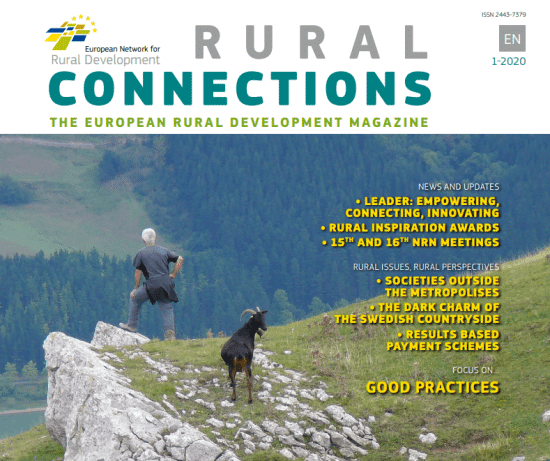
The power of populism lays in its complexity, as the factors behind its rise differ not only from country to country, but also within countries themselves, across social class, economic status and so on. In an article published in the Rural Connections magazine, ECAS Executive Director Assya Kavrakova offers insight into how populists adapt their tactics to the characteristics of the region they are in, with a specific focus on rural areas across Europe. She highlights that their tailored approach requires a tailored response, and civil society organisations (CSOs) can and should play a leading role in countering it.
The article is based on the study ‘Societies outside Metropolises: the role of civil society organisations in facing populism’, commissioned by the European Economic and Social Committee’s Diversity Europe Group and carried out by ECAS.
 The article was originally published in the European Network for Rural Development magazine ‘Rural Connections’.
The article was originally published in the European Network for Rural Development magazine ‘Rural Connections’.
Societies outside the metropolises
A field research study in four European countries explored the causes of populism and the role of civil society in countering the populist trend, particularly in rural areas.
By Assya Kavrakova, ECAS Executive Director
Populism is a very complex and multifaceted phenomenon, manifested at global, European, national and regional level. There are intense disputes between political science experts and within the public at large on its causes and effects, common features and specificities, and debates over the necessary approaches to address the root causes and adverse ramifications.
ECAS was recently commissioned to conduct field research in rural areas in four EU countries (Austria, France, Italy and Poland) by the European Economic and Social Committee’s Diversity Europe Group. The crucial questions behind this research were: what are the factors behind the rise of populism and what role can civil society organisations (CSOs) play to counter populism?
The first answer, in a nutshell, is: no single factor alone causes populism – there is an interplay of factors, which feed on and reinforce each other.
For middle-income groups, for example, the fear of loss of status is the strongest driving factor towards populist parties, while in lower income groups the key factor is the more direct fear of loss of jobs and income.
Similarly, the rejection of migration can be due to cultural factors, but also to fear of job losses or job competition.
‘Anxieties’ and ‘fears’ were often invoked by CSO activists and political science experts interviewed, as populists’ main tactic is the manipulation of popular fears. For example ‘cultural insecurity’ explains why such political forces are getting stronger in countries where the economic situation is in fact quite good.
Geography matters. Citizens’ attitudes towards the EU, migration, and authoritarian tendencies vary between countries, as well as between the different regions within the same country. In some cases, a city-countryside divide emerged clearly.
In France, for instance, rural, peripheral areas feel further and further away from the decision-making arenas, as well as from the big public or private services. This creates a ‘cocktail of resentment’ that easily feeds populist rhetoric.
In Austria, the research highlighted that the collapse of structures for debates around social issues and social bonds in local communities, in combination with the passivity of the traditional political parties in reaching out to rural areas, creates feelings of abandonment and disconnection among citizens. This situation is exploited by populists. The restoration of the public sphere and the civic space is one way to shrink the space for populism.
Here we come to the answer to the second question – the role of civil society organisations.
CSOs can play an important role in raising awareness of the populist phenomenon in their regions and devising effective strategies to address its roots and manifestations. They can give voice to
and advocate for those who are underrepresented or in an underprivileged position, and lead the development of a public sphere for debate at local level. They can effectively promote European values as well.
Some CSOs involved in the research pointed out difficulties in establishing and running activities in rural areas, which contributes even more to the distancing of rural citizens. This was particularly clear in the case of Poland, where civil society organisations in rural areas offer very limited employment opportunities and much lower income levels as compared to CSOs in urban centres. Thus, one key recommendation from the study is to invest more in CSOs in rural areas, better supporting their human resources communication skills and knowledge base.
Another recommendation is to develop better structures for citizens’ deliberation and more direct democracy mechanisms. These should be based on robust debat with clear questions and outcomes, a wellinformed public and long-nurtured culture of direct democracy. This is particularly important to develop what an expert called ‘democracy of proximity’ – direct democracy mechanisms at local level that build on the proximity between authorities and people.
The study also recommends improving EU communications, especially in rural areas, to better inform citizens about the EU’s achievements and funding opportunities. There is a need for bridging the perceived gap between the centre and the periphery, one of the key arguments used by populists and to thus reduce negative attitudes towards the EU.
You can view the original article here (page 13).
To access the ‘Societies outside Metropolises: the role of civil society organisations in facing populism’ study, click here.